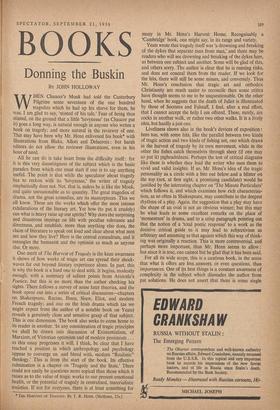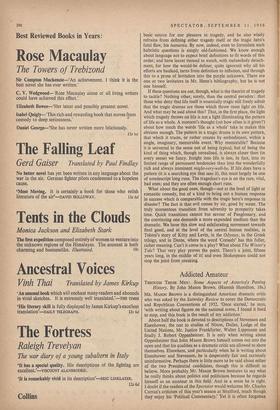BOOKS
Donning the Buskin
BY JOHN HOLLOWAY W• HEN Chaucer's Monk had told the Canterbury Pilgrims some seventeen of the one hundred tragedies which he had up his sleeve for them, he was, I am glad to say, 'stinted of his tale,' Fear of being thus stinted, on the ground that a little 'hevynesse' (as Chaucer put it) goes a long way, is natural enough in anyone who writes a book on tragedy; and more natural in the reviewer of one. This may have been why Mr. Henn enlivened his book* with illustrations from Blake, Allori and Delacroix : but harsh editors do not allow the reviewer illustrations, even in his hour of need.
All he can do is take heart from the difficulty itself : for it is this very dauntingness of the subject which is the basic paradox from which one must start if one is to say anything useful. The point is that while the speculator about tragedy has to reckon with its 'hevynesse,' the writer of tragedy emphatically does not. Not, that is, unless he is like the Monk, and quite unreasonable as to quantity. The great tragedies of drama, not the great comedies, are its masterpieces. This we all know. These are the works which offer the most intense exhilarations of the literary art. Yet how (to put it crudely) can what is heavy raise up our spirits? Why does the surprising and disastrous impinge on life with peculiar relevance and directness, and establish, more than anything else does, the claim of literature to speak out loud and clear about what men are and how they live? Here is the central conundrum, and it entangles the humanist and the optimist as much as anyone else. Or more.
One merit of The Harvest of Tragedy is the keen awareness it shows of how works of tragic art can spread their shock- waves far out beyond literary experience alone. In part, this is why the book is a hard one to deal with. It begins, modestly enough, with a summary of salient points from Aristotle's Poetics; but this is no more than the author checking his sights. There follows a survey of some later theories, and the book opens out into a series of critical discussions—chapters on Shakespeare, Racine. Ibsen, Shaw, Eliot, and modern French tragedy; and one on the Irish drama which (as we might expect from the author of a notable book on Yeats) reveals a genuinely close and sensitive grasp of that subject. This is one dimension. The book also seeks to come home to its reader in another. 'In any consideration of tragic principles we shall be drawn into discussion of Existentialism, of Marxism, of Victorian optimism and of modern pessimism .. . as this essay progresses it will, I think, be clear that I have reached a position in which anthropology and psychology appear to converge on, and blend with, modern "Realistic" theology.' This is from the start of the book. Its effective culmination is a chapter on 'Tragedy and the State.' There could not easily be questions more topical than those which it raises as to the value of tragic works to our present emotional health, or the potential of tragedy in centralised, materialistic societies. If not for everyone, there is at least something for * THE HARVEST OF TRAGEDY. By T. R. Henn. (Methuen, 25s.) many in Mr. Henn's Harvest Home. Recognisably a 'Cambridge' book, one might say, in its range and variety.
Yeats wrote that tragedy itself was 'a drowning and breaking of the dykes that separate man from man,' and there may be readers who will see drowning and breaking of the dykes here, as between one subject and another. Some will be glad of this, and others sorry. The author is clear that he is running risks and does not conceal them from the reader. If we look for the hits, there will still be some misses, and conversely. Thus Mr. Henn's conclusion that tragic art and orthodox Christianity are much easier to reconcile than sonic critics have thought seems to me to be unquestionable. On the other hand, when he suggests that the death of Juliet is illuminated by those of Socrates and Falstaff, I find, after a real effort, that I cannot accept the help I am offered. These, surely, are cocks in another walk, or rather two other walks. It is a lively idea, but hardly a just one.
Liveliness shows also in the book's devices of exposition: here too, with some hits, like the parallel between two kinds of tragic action and two kinds of fishing net, one which draws in the harvest of tragedy by its own movement, while in the other the fishes catch themselves through sheer (if one may so put it) pigheadedness. Perhaps the test of critical diagrams like these is whether they lead the writer who uses them to vivid and valid insights. If so, Mr. Henn's idea of the tragic personality as a circle with a bite out below .and a blister on the top (not, at first sight, a promising candidate) would be justified by the interesting chapter on 'The Minute Particulars' which follows it, and which examines how rich characterisa- tion, as so often in Shakespeare, may contribute to the deepest rhythms of a play. Again, the suggestion that a play may have the shape of an oval is not an obvious winner; but this may be what leads to some excellent remarks on the place of 'momentum' in drama, and to a crisp paragraph pointing out that the notion of a 'total poetic response' to a work as the decisive critical guide to it may lead to subjectivism as arbitrary and assuming as that against which this way of think- ing was originally a reaction. This is more controversial, and perhaps more important, than Mr. Henn seems to allow : but since it is true, one cannot but be glad that it has been said.
For all its wide scope, this is a cautious book, in the sense that what it offers are less answers, or even questions, than importances. One of its best things is a constant awareness of complexity in the subject which dissuades the author from pat solutions. He does not assert that there is some single basic source for our pleasure in tragedy, and he also wisely refrains from defining either tragedy itself or the tragic hero's fatal flaw, his hamartia. By now, indeed, even to formulate such hubristic questions is simply old-fashioned. We know enough about language not to expect brief definitions to fit words of this order; and have learnt instead to watch, with melancholy detach- ment, for how the would-be definer, quite ignorant why all his efforts are baulked, turns from definition to inflation, and through this to a prose of levitation into the purple unknown. There are one or two levitators in Mr. Henn's bibliography, but he is not one himself.
If these questions are out, though, what is the theorist of tragedy to tackle? Nothing other, surely, than the central paradox : that those who deny that life itself is essentially tragic still freely admit that the tragic dramas are those which throw most light on life. And what may be said about this? That, in the first place, the light which tragedy throws on life is not a light illuminating the pattern of life as a whole. A moment's thought (yet how often is it given?) about how much the words 'life as a whole' take in makes this obvious enough. The pattern in a tragic drama is its own pattern, that which it traces, or rather creates by embodiment, within a single, imaginary, memorable event. Why memorable? Because it is universal in the sense not of being typical, but of being the kind of thing which, though unrealised, is always closer than (in every sense) we fancy. Insight into life is less, in fact, into its limited range of permanent tendencies than into the wonderfully rich and always imminent might-very-well-be. If life does have a pattern (it is a searching eye that sees it), this must largely be one of nondescript long runs. The tragedian's eye is on the rare, vital, bad ones; and they are often enough short runs.
What about the good ones, though—not at the level of light or romantic comedy, but of a kind to bring out a human response in success which is comparable with the tragic hero's response in disaster? The fact is that evil comes by air, good by water. The truly momentous transition from adversity to prosperity takes time. Quick transitions cannot but savour of Panglossary, and the convincing one demands a more expanded medium than the dramatic. We have this slow and exhilarating movement towards final good, and at the level of the central human realities, in Tolstoi's story of Kitty and Levin, in the Odyssey, in the Greek trilogy, and in Dante, where the word 'Comedy' has this fuller, richer meaning. Can't it come in a play? What about The Winter's Tale? That very play proves the point. There's a joint, fifteen years long, in the middle of it; and even Shakespeare could not stop the joint from creaking.



































 Previous page
Previous page